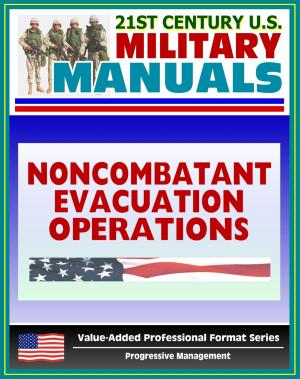21st Century Peacekeeping and Stability Operations Institute (PKSOI) Papers - Lessons Learned from U.S. Government Law Enforcement in International Operations - Panama, Colombia, Kosovo
Nonfiction, History, Military, United States| Author: | Progressive Management | ISBN: | 9781310337109 |
| Publisher: | Progressive Management | Publication: | November 27, 2013 |
| Imprint: | Smashwords Edition | Language: | English |
| Author: | Progressive Management |
| ISBN: | 9781310337109 |
| Publisher: | Progressive Management |
| Publication: | November 27, 2013 |
| Imprint: | Smashwords Edition |
| Language: | English |
The role of law enforcement is becoming increasingly prominent in the conduct of international operations involving the U.S. Government (USG), including counterinsurgency, peace operations, and reconstruction and stabilization. Hence, it is important for practitioners (military and civilian) and policymakers to understand how law enforcement can contribute to the achievement of U.S. strategic objectives and how it integrates into a wider interagency mission structure. This Peacekeeping and Stability Operations Institute (PKSOI) Paper should add to the body of knowledge in this field by presenting the findings from an analysis of U.S. law enforcement contributions to three major post-Cold War commitments.
This report is the product of a year of research conducted by Noetic, under contract by the Emerging Capabilities Division Ground Portfolio Director, Colonel Patrick N. Kelleher, U.S. Marine Corps, within the Rapid Reaction Technology Office of the Office of the Secretary of Defense. This was part of the Law Enforcement Capabilities Project (LECP) which aims to inform USG agencies about issues relevant to law enforcement capabilities on international operations. The Institute for Defense Analyses (IDA) also contributed to the project, with Mr. William Simpkins playing a key role in the research phase. The project team particularly acknowledges the United States Marshals Service (USMS) and the Department of Justice's International Criminal Investigative Training Assistance Program (ICITAP), whose support was invaluable in facilitating research visits to Colombia and Kosovo, respectively. The team also received research and liaison support from representatives of: the Department of State, the Department of Defense, the Department of Justice, the Department of Homeland Security, the United States Agency for International Development, and the United States Army. Input obtained from these representatives has been critical in the preparation of this document; however, the views expressed here are Noetic's, are not official government statements, and are not the official views of the USG. Any errors in this paper are the responsibility of the authors and not any representative of the USG.
The approach taken by the project team and the access facilitated by the interagency participants have permitted a unique and detailed analysis of the subject matter based on recent USG experience. The lessons learned are invaluable for informing future USG endeavors to integrate the full range of law enforcement capabilities, authorities, and perspectives into international operations to achieve national objectives.
The role of law enforcement is becoming increasingly prominent in the conduct of international operations involving the U.S. Government (USG), including counterinsurgency, peace operations, and reconstruction and stabilization. Hence, it is important for practitioners (military and civilian) and policymakers to understand how law enforcement can contribute to the achievement of U.S. strategic objectives and how it integrates into a wider interagency mission structure. This Peacekeeping and Stability Operations Institute (PKSOI) Paper should add to the body of knowledge in this field by presenting the findings from an analysis of U.S. law enforcement contributions to three major post-Cold War commitments.
This report is the product of a year of research conducted by Noetic, under contract by the Emerging Capabilities Division Ground Portfolio Director, Colonel Patrick N. Kelleher, U.S. Marine Corps, within the Rapid Reaction Technology Office of the Office of the Secretary of Defense. This was part of the Law Enforcement Capabilities Project (LECP) which aims to inform USG agencies about issues relevant to law enforcement capabilities on international operations. The Institute for Defense Analyses (IDA) also contributed to the project, with Mr. William Simpkins playing a key role in the research phase. The project team particularly acknowledges the United States Marshals Service (USMS) and the Department of Justice's International Criminal Investigative Training Assistance Program (ICITAP), whose support was invaluable in facilitating research visits to Colombia and Kosovo, respectively. The team also received research and liaison support from representatives of: the Department of State, the Department of Defense, the Department of Justice, the Department of Homeland Security, the United States Agency for International Development, and the United States Army. Input obtained from these representatives has been critical in the preparation of this document; however, the views expressed here are Noetic's, are not official government statements, and are not the official views of the USG. Any errors in this paper are the responsibility of the authors and not any representative of the USG.
The approach taken by the project team and the access facilitated by the interagency participants have permitted a unique and detailed analysis of the subject matter based on recent USG experience. The lessons learned are invaluable for informing future USG endeavors to integrate the full range of law enforcement capabilities, authorities, and perspectives into international operations to achieve national objectives.















